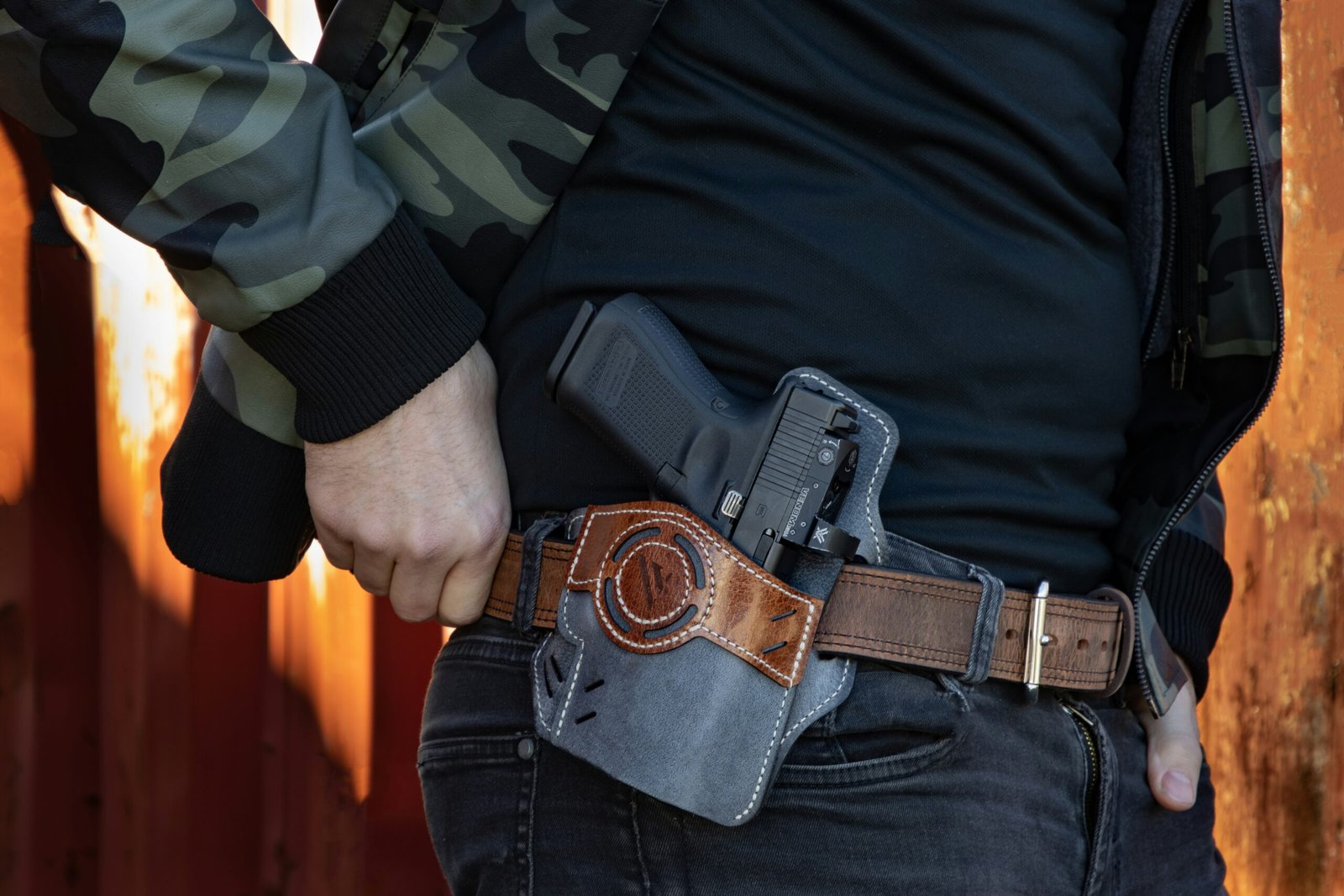In this informative guide, you will gain a comprehensive understanding of the ins and outs of gun laws when it comes to transporting firearms in your vehicle. Whether you are a gun owner, an enthusiast, or simply curious about the legalities involved in transporting firearms, this article will provide you with valuable insights and valuable information on how to navigate the complex world of gun laws for vehicle transport. From regulations on interstate travel to securing firearms in your vehicle, we will cover it all, ensuring you have the knowledge you need to stay legal and safe while transporting your firearms.
Federal Gun Laws
The National Firearms Act (NFA)
The National Firearms Act (NFA) was passed in 1934 and regulates the possession, transfer, and taxation of certain firearms. Under the NFA, items such as machine guns, short-barreled shotguns, and silencers are subject to strict regulations. These firearms require registration and the payment of a tax. It is important to familiarize yourself with the specific requirements of the NFA before transporting any firearms covered by this act.
The Gun Control Act (GCA)
The Gun Control Act (GCA) was enacted in 1968 and serves as the backbone of federal firearms laws. The GCA establishes the categories of firearms that are illegal to possess, regulates firearm transfers, and sets the minimum age requirements for purchasing firearms. It is crucial to understand the provisions of the GCA in order to comply with federal law when transporting firearms in a vehicle.
The Firearm Owners Protection Act (FOPA)
The Firearm Owners Protection Act (FOPA), passed in 1986, was designed to protect the rights of law-abiding gun owners while addressing concerns over illegal firearms trafficking. FOPA includes provisions that safeguard the rights of individuals traveling with firearms, such as the safe passage provision. This provision allows individuals to transport firearms through states where they may otherwise be considered illegal, as long as certain requirements are met. Knowing your rights under FOPA is essential when transporting firearms across state lines.
Transporting Firearms in a Vehicle
Unloaded and Secured in a Locked Container
When transporting firearms in a vehicle, it is important to ensure they are unloaded and securely stored in a locked container. A locked container can be a trunk, a locked glove compartment, or a similar secure compartment within the vehicle. By keeping firearms unloaded and locked away, you are adhering to general safety guidelines and minimizing the risk of accidental discharge.
Amendment Laws for Transporting Firearms
Certain states have enacted amendment laws that may further regulate the transportation of firearms in vehicles. These laws may impose additional requirements, such as the use of specific locking mechanisms or the need to keep firearms in a separate compartment from ammunition. It is crucial to familiarize yourself with the applicable amendment laws in your state to ensure compliance.
Exceptions for Concealed Carry Permit Holders
Concealed carry permit holders may be granted certain exceptions when transporting firearms in a vehicle. These exceptions vary by state, so it is important to research the specific laws and regulations regarding concealed carry and transportation. In some states, concealed carry permit holders may be allowed to have loaded firearms within reach while driving, provided they meet the requirements outlined in state law.

This image is property of images.unsplash.com.
State-Specific Gun Laws
Research on State Laws
State laws regarding firearm transportation can vary significantly. It is important to conduct thorough research on the gun laws of each state through which you plan to travel. This includes understanding the definitions of prohibited firearms, any additional requirements for transporting firearms, and any restrictions on ammunition.
Transporting Firearms Across State Lines
Transporting firearms across state lines requires adherence to both federal and state laws. Even if your firearms are legal in your home state, they may not be legal in another state you are traveling to. Many states have different regulations for transporting firearms, so it is essential to comply with the laws of each state you pass through or visit.
Understanding Reciprocity Laws
Reciprocity laws determine whether your concealed carry permit from one state is recognized in another. It is important to understand which states recognize your permit and which do not. Failure to comply with reciprocity laws can result in serious legal consequences. Always research and abide by the reciprocity agreements between your home state and the states you plan to travel to with your firearms.
Firearm Registration Requirements
Checking State-Specific Registration Laws
While federal law does not require the registration of firearms, some states have their own firearm registration requirements. It is crucial to check the registration laws of each state you plan to travel in and ensure compliance. Failure to register firearms in states that require it can lead to criminal charges and potential confiscation of your firearms.
Federal Registration Process
Although firearm registration is not mandatory at the federal level, there are certain instances where it is required. This includes the transfer of certain firearms covered by the NFA, such as machine guns and silencers. The federal registration process involves submitting the necessary paperwork, including fingerprints and a background check, along with the payment of a tax.
Consequences of Non-Compliance
Non-compliance with firearm registration requirements can have serious consequences. Violating state registration laws can result in criminal charges, fines, or the loss of your firearms. Ignoring federal registration requirements, such as those outlined in the NFA, can lead to federal charges, significant fines, and the confiscation of your firearms.

This image is property of images.unsplash.com.
Transporting Firearms Ammunition
Understanding Ammunition Laws
In addition to firearm transportation, it is important to be aware of ammunition laws when traveling with firearms. Certain types of ammunition may be restricted or prohibited in some states. It is essential to research the laws and regulations pertaining to ammunition in each state you plan to travel through or visit.
Safe Storage and Transportation
When transporting firearms ammunition, it is recommended to store it separately from firearms. Ammunition should be stored in a sturdy container, such as a locked ammo box, to prevent accidental discharge or unauthorized access. Placing the ammunition in a different part of the vehicle from the firearms adds an extra layer of safety and ensures compliance with best practices.
Limitations on Ammunition
Some states place limitations on the amount of ammunition you can possess or transport. These limitations can vary, so it is crucial to research the ammunition restrictions in each state you plan to travel through. Failure to comply with ammunition limitations can result in legal consequences, including criminal charges and the seizure of ammunition.
Transporting Firearms in Commercial Vehicles
Federal Regulations for Commercial Transport
If you are planning to transport firearms in a commercial vehicle, such as a truck or van, there are additional federal regulations to consider. The Bureau of Alcohol, Tobacco, Firearms and Explosives (ATF) has specific rules regarding the transportation of firearms in commercial vehicles. It is essential to understand and comply with these regulations to ensure legal and safe transportation.
Carriers’ Policies and Restrictions
Commercial carriers, such as shipping companies or airlines, often have their own policies and restrictions regarding the transportation of firearms. It is important to contact the carrier in advance to understand their specific requirements and procedures. This may include filling out additional paperwork, using specific packaging, or complying with certain security measures.
Ensuring Compliance with Regulations
Compliance with federal regulations and carrier policies is crucial when transporting firearms in commercial vehicles. Failure to comply can result in the rejection of transportation services, additional fees, or potential legal issues. It is recommended to review the regulations and policies beforehand and ensure that you meet all the necessary requirements for the safe and legal transport of firearms.

This image is property of images.unsplash.com.
Transporting Firearms in Rental Vehicles
Reviewing Rental Car Company Policies
When renting a vehicle for the purpose of transporting firearms, it is important to review the policies of the rental car company. Some rental car companies have specific policies regarding the transportation of firearms, while others may have restrictions in place. It is necessary to understand and comply with these policies to avoid any complications during your travels.
Notifying the Rental Car Company
In some cases, rental car companies may require advance notice or written notification if you plan to transport firearms in their vehicles. This allows them to document and account for the presence of firearms in their vehicles. It is recommended to contact the rental car company prior to your trip and inquire about their requirements regarding firearm transportation.
Legal Requirements and Recourse
Failure to comply with rental car company policies regarding firearm transportation can have legal consequences. This may include penalties, termination of the rental agreement, or refusal of future rental services. It is important to understand and adhere to the legal requirements set forth by the rental car company to ensure a smooth and trouble-free experience.
Transporting Firearms Across International Borders
Research on International Laws and Regulations
Transporting firearms across international borders requires thorough research on the laws and regulations of both the departure country and the destination country. Each country has its own set of rules and requirements regarding the importation and transportation of firearms. It is essential to understand these regulations and adhere to them to avoid legal issues or complications.
Customs Declarations and Permits
When crossing international borders with firearms, it is necessary to declare them to customs officials. This typically involves completing a customs declaration form and presenting the appropriate permits and documentation. It is important to ensure you have obtained the necessary permits and complied with all customs requirements before attempting to travel with firearms internationally.
Liaising with Authorities in Destination Country
In addition to customs declarations, it may be necessary to liaise with the authorities in the destination country to ensure compliance with their specific regulations. This may involve obtaining import permits, registering firearms with local authorities, or adhering to any additional requirements. Contacting the embassy or consulate of the destination country in advance can provide valuable information and guidance.
Firearm Transport and Vehicle Concealment
Understanding Vehicle Concealment Laws
Vehicle concealment laws vary by state and can impact the way firearms are transported in a vehicle. Some states may require firearms to be fully visible and openly transported, while others may allow concealed carry within a vehicle. It is essential to familiarize yourself with the specific laws of each state you will be traveling through to ensure compliance with vehicle concealment regulations.
Consequences of Improper Concealment
Improper vehicle concealment of firearms can have serious legal consequences. Being unaware of or failing to comply with concealment laws can result in criminal charges, fines, or the seizure of firearms. It is crucial to understand the laws of each state and abide by them to avoid any legal complications during your travels.
Safe and Legal Storage within a Vehicle
To ensure safe and legal storage within a vehicle, firearms should be securely stored in a locked container when not in use. This can be a trunk, a locked glove compartment, or a similar compartment designed for secure storage. Storing firearms in a safe and legal manner minimizes the risk of theft, accidental discharge, or unauthorized access.
Tips for Safe Gun Transportation in a Vehicle
Separating Ammunition and Firearms
When transporting firearms in a vehicle, it is recommended to separate ammunition from firearms and store them in different locations within the vehicle. This adds an extra layer of safety and ensures compliance with some state laws that require ammunition and firearms to be stored separately. By separating ammunition and firearms, you minimize the risk of accidental discharge and unauthorized access.
Properly Securing Firearms and Ammunition
Ensure that firearms and ammunition are properly secured within the vehicle to prevent movement, damage, or theft. This can be accomplished by using locking containers, gun cases, or similar secure storage options. It is important to choose sturdy and reliable containers that meet the legal requirements of the jurisdictions you will be traveling through.
Keeping Legal Documents Handy
Always keep your legal documents, including permits, licenses, and registrations, easily accessible during your travels. This allows you to promptly present them if requested by law enforcement or other authorities. Having your legal documents readily available helps establish your compliance with gun laws and can expedite any potential interactions or inquiries.



